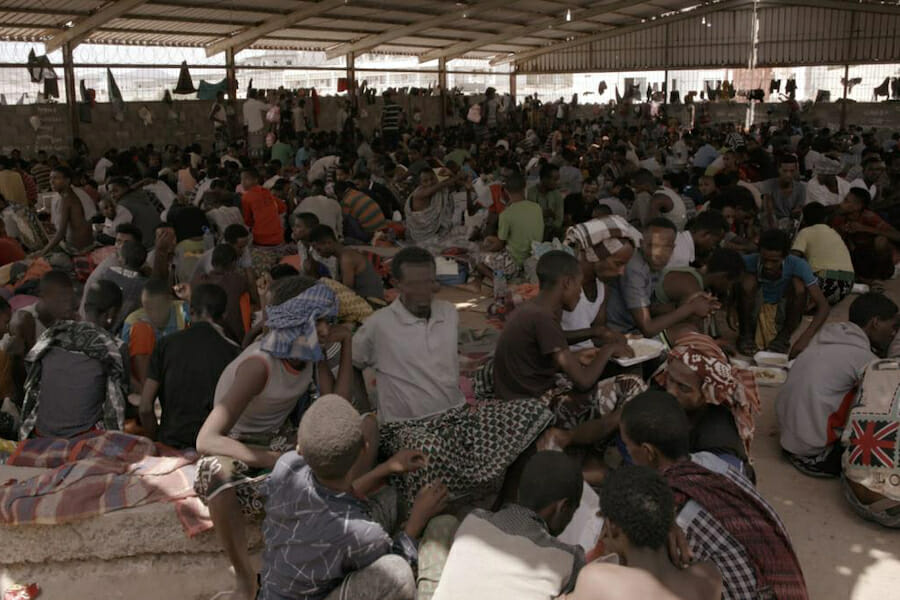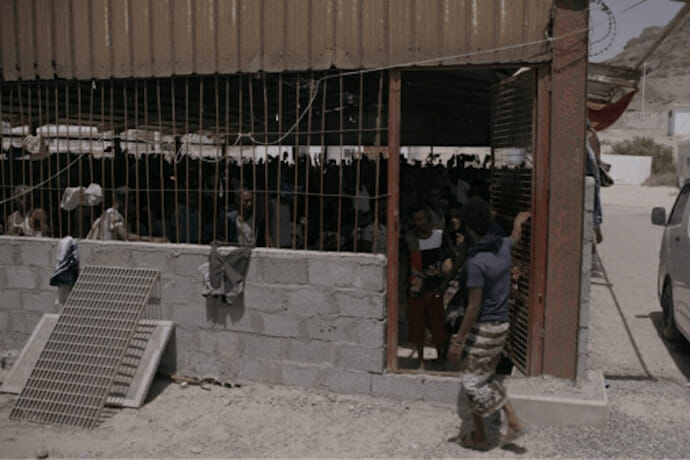
African Migrants in Yemen between Abuse and Recruitment
Yemen has been involved in a devastating civil war for more than four years, causing one of the most serious humanitarian crises in history, yet Yemen continues to attract African migrants who are unaware of the dangers of traveling to a country such as Yemen.
About 20,000 migrants risk traveling to Yemen by sea every month, according to the International Organization for Migration (IOM). Most of the migrants are Ethiopians and Somalis. They leave their countries for economic and security reasons.
The hope of getting a decent life in the Gulf states drives those desperate to risk their lives on a dangerous journey across the sea first, then across the conflict areas of the Yemeni mainland.
The risks to African migrants include drowning, kidnapping, extortion, and forced detention.
In January 2018, at least 30 African refugees drown off the coast of Yemen after being fired on by smugglers. Stories of this kind have been repeated regularly for years.
“Reports of abuse inside detention facilities are numerous with some new arrivals being subject to physical and sexual violence. Survivors have described to UNHCR being shot at, regular beatings, rapes of adults and children, humiliations including forced nudity, being forced to witness summary executions and denial of food,” UNHCR spokesperson William Spindler said at a press briefing at the Palais des Nations in Geneva in April 2018.
According to Human Rights Watch, Yemeni government officials have tortured, raped, and executed migrants and asylum seekers from the Horn of Africa in a detention center in the southern port city of Aden in 2018. Bill Frelick, refugee rights director at Human Rights Watch, asked the Yemeni government to put a stop to these practices and hold those responsible to account.
Yemen’s Interior Ministry, in response to the Human Rights Watch preliminary findings, wrote in an April 2, 2018, letter that they had removed the center’s commander and begun procedures to transfer the migrants to another location.

Despite the Yemeni government’s promises, practical steps have not yet been taken to solve the problem or to mitigate its effects. In April of this year, security authorities in Aden detained hundreds of African migrants who entered Yemen illegally. The campaign of arrests aims to repatriate migrants.
Alarmingly, the Aden police departments were unable to absorb the immigrants because of their large numbers; they were all taken to football fields. Detainees receive food and water from relief agencies, including the UAE Red Crescent and the United Nations International Organization for Migration (IOM), as well as aid from the residents of Aden. Despite these modest efforts, the detainees face poor humanitarian and health conditions.
Things are getting worse for African migrants in northern Yemen, where the Houthis control. According to military sources, there are three training camps for African mercenaries run by the Houthi militias in the coastal province of Hodeidah in western Yemen. These sources claim that the Houthis are dragging African migrants and recruiting them for a monthly salary of $100.
The Houthi group is not the only armed group that could recruit African migrants. In 2011, CNN reported that intelligence sources fear growing collaboration between Al Shabaab, which a jihadist fundamentalist group based in East Africa, and al Qaeda in the Arabian Peninsula, due to the increasing number of Somalis arriving in Yemen, many of whom live in miserable camps that could be places of recruitment for Islamist movements.
With the increasing number of African migrants to Yemen’s southern coasts, such as Aden and Shabwa, the population’s health and security concerns are increasing. Some political analysts assume the existence of internal and external forces behind this crisis in order to destabilize security and stability in southern Yemen.
According to Human Rights Watch in a report last year, the Houthi group arbitrarily detained migrants in poor conditions and did not grant them asylum nor protective measures at a facility near the coastal city of Haddayda. According to the report, at least one group of migrants – 87 people, including seven children – were released in Hodeidah, provided they travel to Aden.
Yemen has been living a war and a humanitarian crisis for more than four years, and problems such as the refugee crisis will only deteriorate further, especially with a weak government that is unable to effectively manage the country.
The continued influx of thousands of African migrants into Yemen and the inability to control them could lead to an increasing number of victims, both at sea and on Yemeni land or on the border with Saudi Arabia, the number one destination for migrants.
But those migrants who safely manage to cross all risks and reach Saudi Arabia will add more trouble and distract efforts of the Saudi government, which is embroiled in a protracted war in Yemen.

